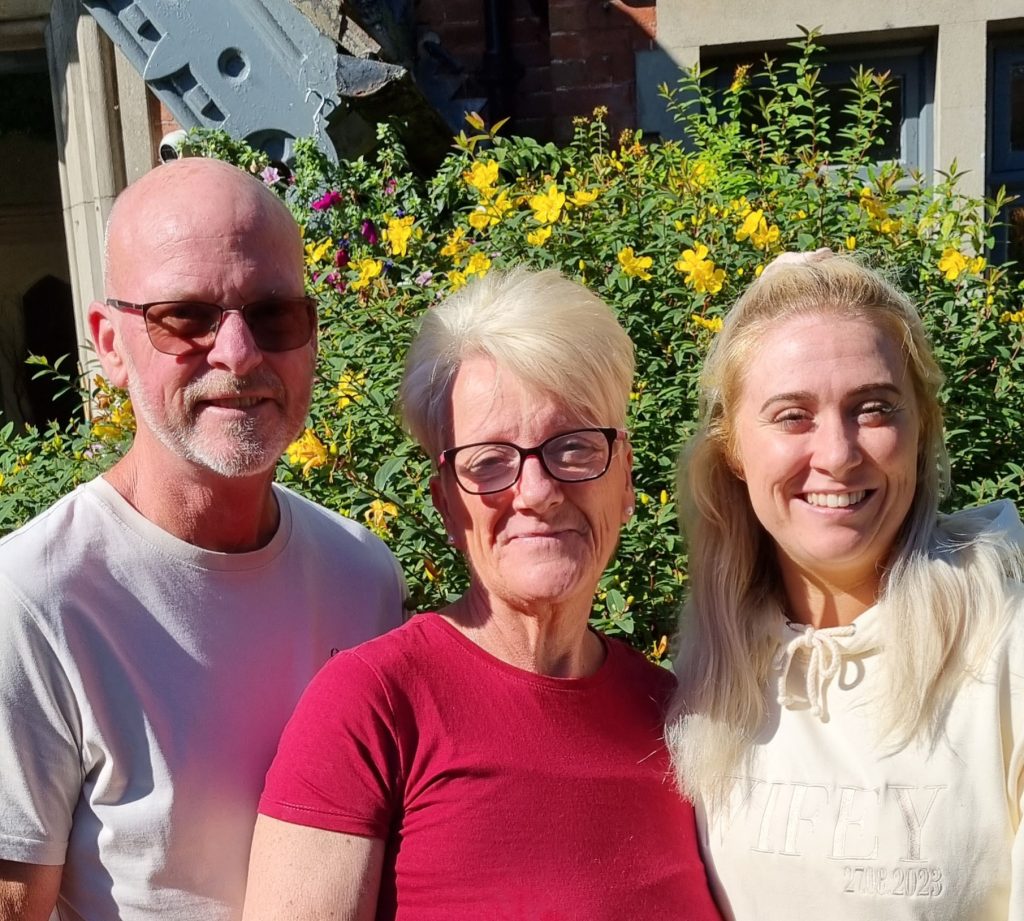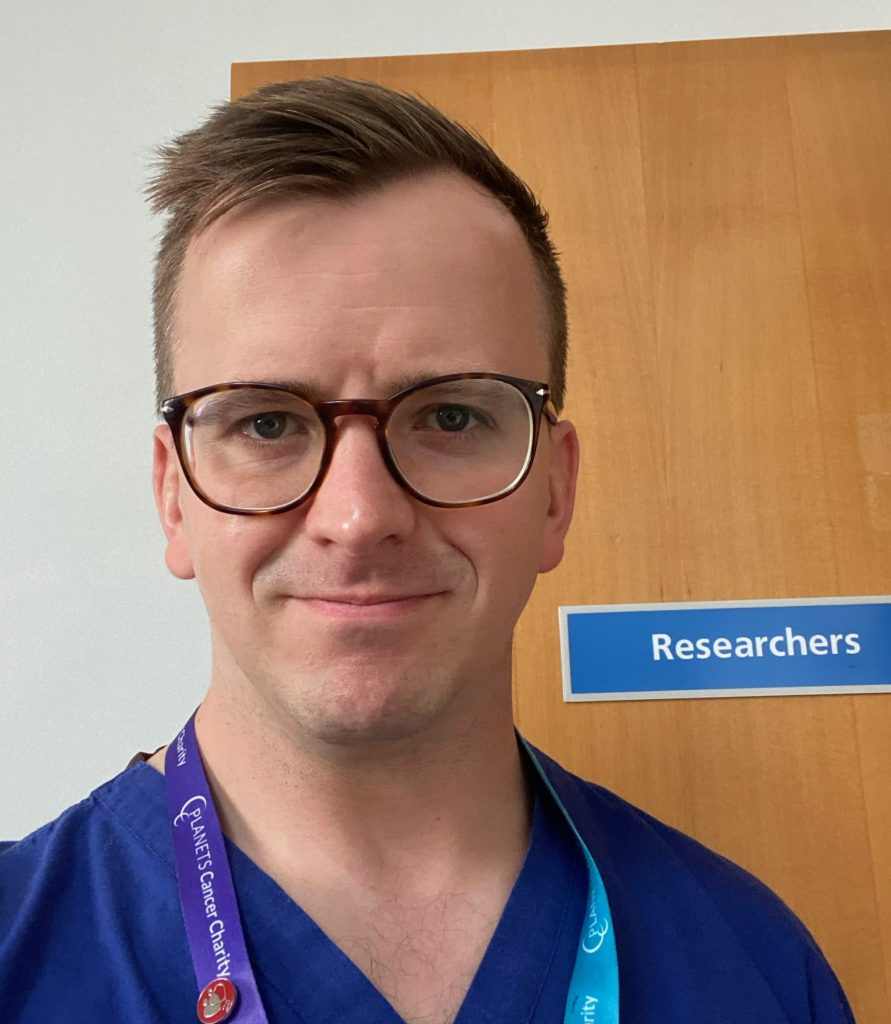FUNDRAISING FOR A CURE
Donating is simple, fast and totally secure. Your details are safe with us and we will never sell them
 Cancer patient spearheading research project after surgery
Cancer patient spearheading research project after surgery
A cancer patient who has undergone traumatic but life-saving surgery is spearheading a research project that aims to transform treatment options and outcomes for others in the future.
Sharon Applin, 58, from Wimborne in Dorset, was diagnosed with a skin cancer in 2020 which was initially treated successfully with chemotherapy and radiotherapy.
However, by the start of 2022 she began feeling unwell with bleeding, diarrhoea and severe pain. Tests confirmed she was suffering from cancer affecting the abdomen and pelvis which would require major surgery.
Sharon was told the operation, known as a total pelvic exenteration, would last for around 15 to 20 hours and involve removing all organs within her pelvis – including the bladder, rectum and part of the colon, along with her uterus, fallopian tubes and ovaries – and part of her pelvic and pubic bones.
In addition to this, she was informed she would need skin and muscle removed from her abdomen to repair the areas affected, and fill in the void left in the pelvis.
“After being treated successfully at Poole Hospital just a couple of years before, it was devastating to find out my cancer had returned,” said Sharon, who is married to Sean, also 58, and mother to 29-year-old Kelly.
“I was sent onto an amazing team at University Hospital Southampton who conducted tests and explained very clearly that without major surgery I had only six months to a year to live – but also that there was no guarantee that I would come round from the operation given the extent of the surgery involved.
“I had no intention of not having the surgery, though to come round from the operation and have the realisation of what had been removed and what I didn’t have any more was an emotion I never wanted to experience.
“However, while the operation has left me with a life-changing condition – I now have two stoma bags for example – I am alive and I will be forever grateful to the team for making that possible.”
Around 4,000 patients need treatment for advanced pelvic cancers in the UK every year and treatment is challenging.
Surgery usually requires removal of multiple pelvic organs, including muscles, bone, and skin around the anus and this can lead to complications relating to both the empty space left in the pelvis (empty pelvis syndrome) and closure of the surgical area.
As a result complications can occur frequently, reducing speed of recovery and quality of life.
Now, a new study – Reconstruction in Extended MArgin Cancer Surgery (REMACS) – is underway to investigate complication frequency, quality of life and financial implications following different reconstruction techniques.
It is hoped the study will improve patient and doctor decision-making and find the best methods of reconstruction to improve outcomes.
The study, being led by researchers at University Hospital but taking place at eight sites across England, is funded in part by PLANETS Cancer Charity, which helps patients with pancreatic, liver, colorectal, abdominal and neuroendocrine cancers.
“Life has been difficult since the operation and I have had to change the way I think about my everyday routine,” explained Sharon. “Where am I going and is there a toilet nearby? Can I park my car nearby? How long am I going to be away from home?
“I need to make sure I have my stoma bags stocked up just in case of an emergency and a change of clothes in case of any leaks. I can’t just walk out the door anymore. I have to think about it. This is a mental strain all the time and has changed my life.
“When I was in hospital I was asked if I would be interested in helping with cancer research, including donating my
organs and helping with the REMACS study.
“I agreed to this and I have been involved with the research ever since. Being involved has helped me come to terms with what I have had done, what I have been through and to understand how pelvic exenteration is done.
“Being involved in the research and providing my own input into what I feel is important to the operation – and seeing what others think – will hopefully help people undergoing treatment and surgery in the future.
“My overall experience of this treatment has been a very hard journey, but with the correct care and support of the nurses and doctors, you can achieve anything. The important thing now is ensuring the best reconstruction and quality of life can be achieved for patients in this situation.”
Charles West, colorectal surgery research fellow at the University of Southampton and study lead, said: “Patients presenting with cancers in the abdomen and pelvis that are very advanced at diagnosis or have come back after previous treatment are difficult to manage.
“Survival is poor unless surgery is performed to remove all the cancer, however, while these procedures are life-saving, they can be very invasive and leave large wounds that can cause complications and reduced quality of life for patients. The full impact on quality of life is not well known about currently.
“There are methods of reconstruction available to improve quality of life, however, doctors are not currently sure which method of reconstruction gives the best outcomes, which is something the REMACS study hopes to establish.”
He added: “The participation and support of patients like Sharon is invaluable and, through sharing her story, she is helping us to increase interest and involvement in the study which will undoubtedly lead to improvements in quality of life for patients in the future.”
READ ABOUT HOW FUNDS ARE USED
Subscribe to our Newsletter
Get informed about the latest news straight to your inbox





